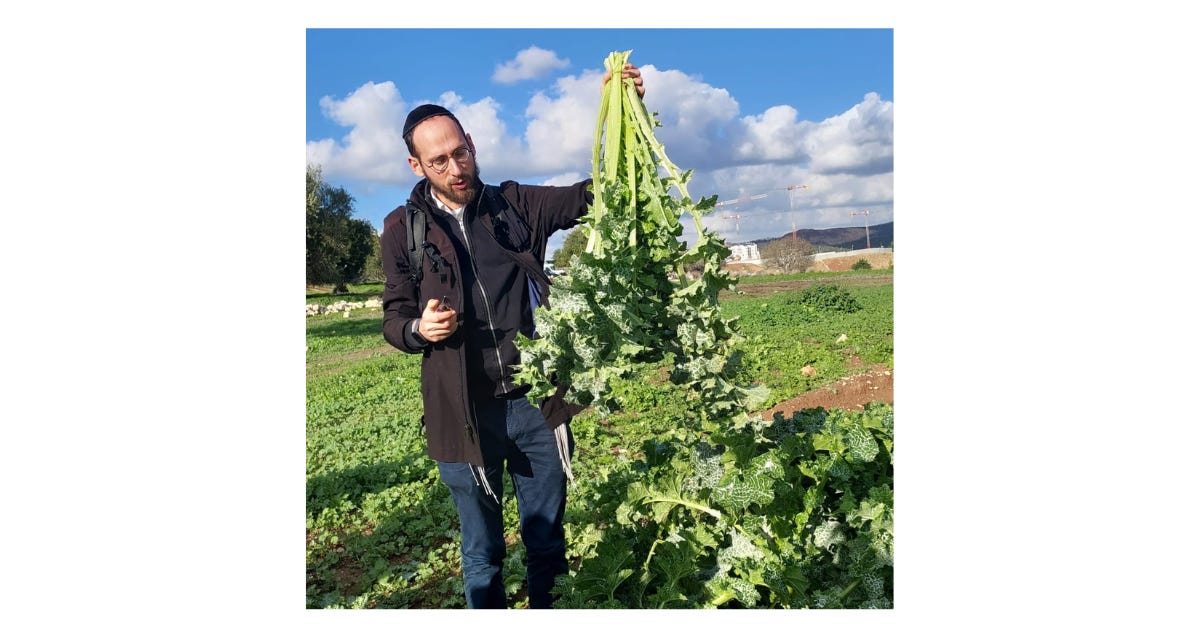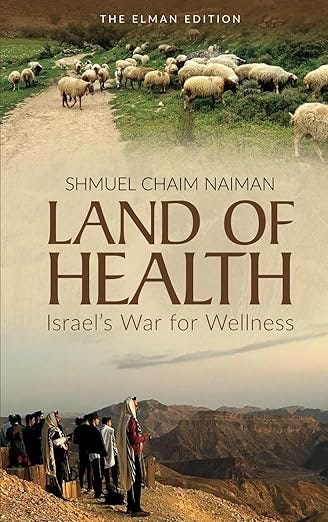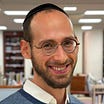Land, Body & Soul: Health in Jewish Life with Rabbi Shmuel Chaim
Chocolate Stuffed Date Recipe
What does it mean to be a healthy Jew—in body, soul, and connection to the land?
In this earthy and wise conversation, I sit down with Rabbi Shmuel Chaim, who’s not only a teacher of Torah but also a forager, walker, and someone deeply grounded in the natural world. His simple two-ingredient recipe is my kind of eating—no overcomplication, just essence.
We talk about how walking is a spiritual practice, why connecting to land matters, and how being a "healthy Jew" isn’t about gym memberships or food trends, but about aligning our physical and spiritual selves in everyday life.
Being a healthy Jew is about balance: body care, soul growth, and community connection. Shabbat is not just spiritual—it’s bodily recovery. The rhythm of rest sustains health. And it’s also about resisting the over-commercialization of wellness by returning to simplicity, intention, and tradition.
This interview nourished me—I hope it does the same for you.
Let’s begin with you. Please introduce yourself to our readers. What shaped your path—spiritually, physically, or personally—on the way to becoming a rabbi, a health teacher, and a foraging guide?
I’ve always appreciated everything natural—and been suspicious of anything artificial. (Yes, even AI.) As a kid, I never understood how people could eat artificial flavorings. Don’t you want your food to be real?
That desire to connect directly with life and the world as they actually are is a big part of who I am. It’s made me something of a “truth seeker”—for better and for worse. I care more about meaningful ideas and experiences than making money or having fun.
It’s no surprise, then, that I’m passionate about learning and teaching Torah—not as a bunch of nice ideas or annoying rules, but as an all-encompassing system for growing into a Healthy Jew, in body, mind, heart, and soul.
My path to this work wasn’t straight. I started out editing and researching other people’s ideas, but eventually felt called to something more grounded. I went back to college and became certified as a Healthy Lifestyle Counselor. When I graduated, I launched Healthy Jew with a weekly newsletter (now over 150 posts strong), which grew into a thriving foraging business and my current role guiding and teaching gap-year students at Lev HaTorah yeshiva.
You describe Healthy Jew as a way of life—not just eating vegan pizza or lifting weights. What does this vision of health really mean to you?
“Health” and “Jew” balance each other. As a Jew, I’m not chasing the perfect biochemical reaction to get lean or lift a car. There’s no spiritual value in either of those things.
Instead, everything I do for health serves a larger, two-stage purpose, based on the Rambam (Introduction to Pirkei Avos 5, Hilchos Deos 3): First, I become a genuine human being by aligning my physical actions with healthfulness, learning to act with purpose. Then, with that foundation, I can pursue the higher purpose of life: to know God and emulate God’s ways—kindness, justice, compassion.
That framework simplifies healthy living. I don’t have to become some ideal “picture guy.” I just have to care for my body as best I can—because this is the vessel I live in.
Practically, I break it down like this:
Eat Well: what, when, and how much we eat and drink — life coming in
Move Well: walking, hiking, running, stretching — life going out
Be Well: learning to embrace challenges and let go, with purpose
Foraging is a core part of your teaching. What does it mean to eat plants your ancestors may have eaten—and how does this connect us more deeply to the Land of Israel and our own bodies?
God’s first message to Pharaoh was: “My firstborn son is Israel.” We’re called “son” in the singular. We know we share a common soul—but where’s the body?
Some of our greatest sages taught that the Land of Israel is the body of the Jewish people.
And yet, most of us experience it as a war-torn country of concrete towers and highways jammed with metal boxes on fire (or batteries). That’s not its essence.
Foraging reconnects us to the living land. It’s a way to taste the Israel our ancestors knew—literally. It’s also a powerful gateway into healthy living.
Wild plants silently witness the passage of time. When I stand next to a terebinth tree in the Elah Valley—where David fought Goliath—I feel connected to our people’s past, present, and future. Those trees still grow berries that soothe canker sores—just like they did thousands of years ago.
Or take wild lettuce, which grows around Pesach. It’s likely the original maror—and yes, it’s actually bitter! Its milky sap even contains trace opioids, making it a calming herb.
Foraging isn’t just about food. It trains your body and soul. It’s how humans originally exercised—moving through nature to gather nourishment. It teaches stillness and balance. Plants are rooted deep in the earth; by connecting with them, we too can slow down, reconnect, and grow.
Your book is called Land of Health: Israel’s War for Wellness. That’s a bold title. What is Israel fighting for when it comes to health—and what’s at stake if we ignore it?
After the terrible attacks of October 7, 2023, the Jewish people found ourselves in three wars: a war of bodies, a war of minds, and a war of wellness.
The first two belong to the army and the media. But the war for wellness? That’s where every single Jew has a role.
We’re all facing fear, overload, and stress. We’re all searching for meaning inside the madness.
If we neglect this third war, we risk losing the health, resilience, and faith we need to survive the other two. We’ll get lost in anxiety, or burn out from helpless rage. And we’ll miss our own lives, which are happening right here, right now.
Even when the physical battles end—may it be soon—our emotional and spiritual healing will just be beginning. And many will ask: “Is this really worth it?”
That’s why I wrote Land of Health. It’s based on my best Healthy Jew posts and offers strategies to help each of us win our personal war for wellness.
Part One: shows how the Land of Israel is the healthy body of the Jewish People—and how recognizing this is key to our national healing.
Part Two: gives practical advice on eating, movement, emotional balance, and spiritual resilience—especially during difficult times.
I also included dozens of full-color photographs taken during the war, to show the enduring beauty and vitality of Israel—even when the world feels upside down.
What are some practical, sustainable steps people can take to “eat well, move well, be well”—especially if they feel overwhelmed by health advice?
A very real question—and one I focus on constantly, because practicality matters more than perfection.
Here’s a quick taste of each area:
Eat well: Shop like a forager. If it came from the earth—or from an animal that ate from the earth—it’s food. If it came from a lab, it’s a food-like substance. (There’s a gray zone, like plain potato chips. I call that “almost real” food.)
Move well: The most important thing is to move your body consistently. For me, that means walking briskly and regularly. For you, it might be dancing, running, swimming, lifting, or hiking—whatever keeps you coming back and feeling good.
Be well: Explore one or two mental wellness tools—maybe a guided meditation app or a book on emotional resilience. Try them for a month. If something clicks, make it a habit.
You talk about “sensible spirituality.” What does that mean in a Jewish context—especially for those burned out on rigid religious frameworks?
The “Healthy” part of Healthy Jew—personal and national—isn’t the end goal. The “Jew” part is.
We need a relationship with Torah, mitzvot, and God that’s real—one that makes sense, feels authentic, and helps us grow. That’s not a compromise; that’s the point.
I call this “sensible spirituality”: a Judaism that embraces our health, our struggles, our bodies—and finds holiness in all of it. It means seeking out teachings and practices that connect to our lives today, without dismissing the tradition. God gave us Judaism because God believes we’re worth it.
What’s one lesson or insight from Land of Health you hope every reader takes away—and how can people begin living it today?
We’re never going to get life or health perfect. But we can sincerely want to grow—and we can take real steps to get there.
That’s Israel’s lesson: It’s a real, physical land, where everything ages and dies. And yet, it’s also the perfect place for imperfect people to seek out God, health, and wholeness.
Recipe:
100% Chocolate-Stuffed Dates
I’m not much of a cook. But here’s a healthy, delicious snack that’s cheap and takes no time to make:
Slice a date open and stuff it with a small square of 100% cocoa chocolate.
That’s it.
Dates are highly nutritious and rarely processed with added sugar or preservatives. In Israel, a kilo often costs less than 20 shekel (~$6).
Look for pure chocolate. Anything less than 100% cocoa contains sugar—so even 72% is 28% sugar. Here, the sweetness comes only from the real-food date.
It’s a quick, satisfying dessert—and a small act of eating well.
To learn more or get in touch with Rabbi Shmuel Chaim, visit healthyjew.org—you’ll find everything there, including a link to his book: Land of Health: Israel’s War For Wellness on Amazon.
Rabbi Shmuel Chaim invites us to remember that health doesn’t have to be complicated.
He reminds us that being a healthy Jew means caring for our bodies, nurturing our souls, and staying rooted in land & community. In a world that often sells wellness as a luxury, his message brings us back to common sense.
Which of his insights spoke to you most?
Share your thoughts in the comments—I’d love to hear what landed for you.
To Our Health & Inspiration
Kenden
















Thank you for inviting me to Jewish Food Hero, and for preparing this beautiful post from our interview. I hope the JFH community finds it informative, interesting, and helpful!